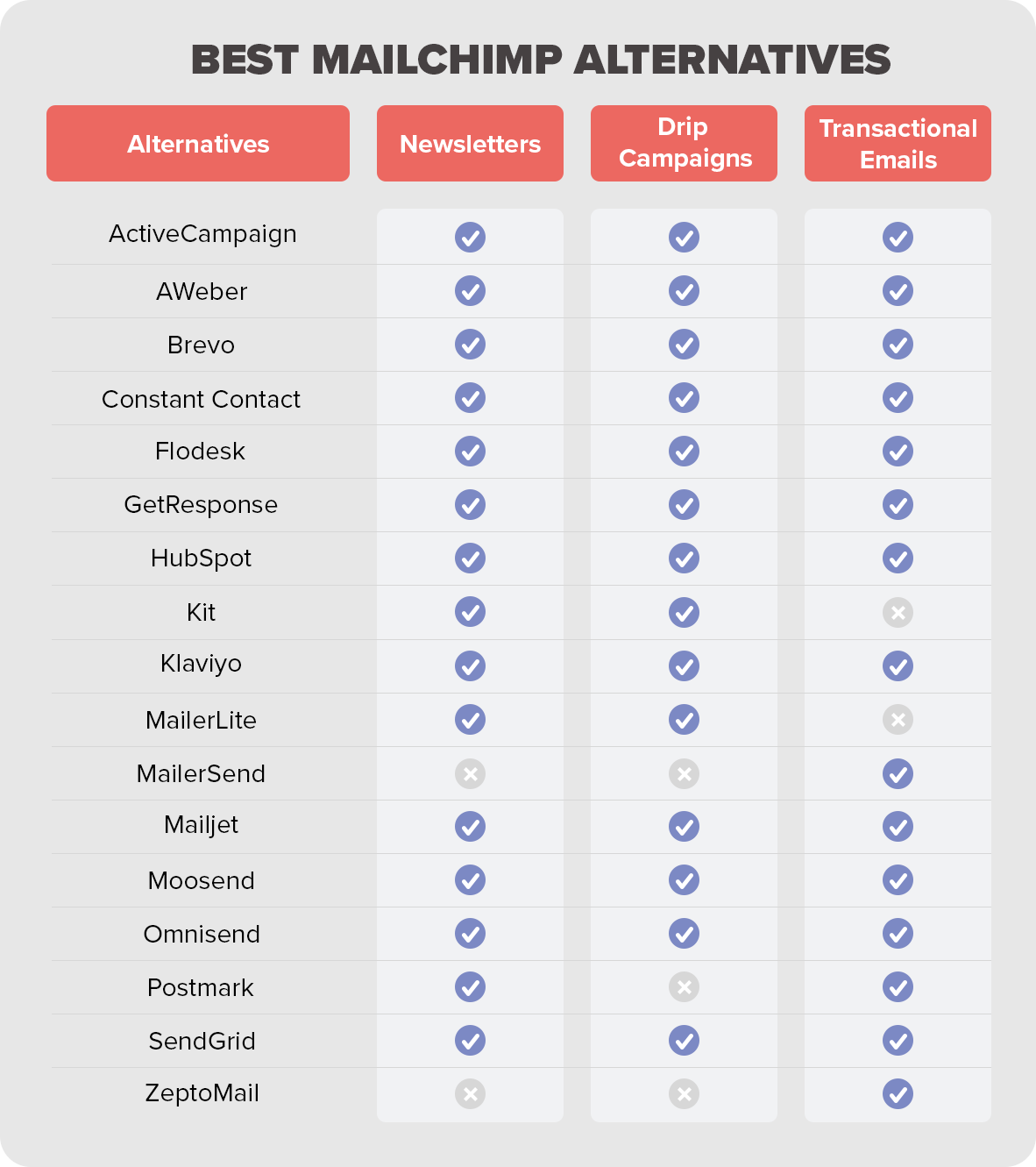Mailchimp is one of the most popular email marketing tools. However, your business may be looking for alternatives with lower prices, a simpler and more intuitive interface, or specific features that better suit your email marketing needs—like advanced segmentation options or increased A/B testing capabilities. Here’s how a few of the best email marketing platforms compare to Mailchimp.
- Best Overall: Constant Contact
- Best for Newsletters: Omnisend
- Best for Drip Campaigns: ActiveCampaign
- Best for Transactional Emails: SendGrid

Best for Newsletters
When it comes to creating and sending newsletters, choosing a platform that’s user-friendly and affordable is important. Many Mailchimp alternatives offer exceptional features, such as customizable templates, automation, and segmentation. Learn about these top platforms for newsletters below.
AWeber
- Price: Free features; paid plans starting at $15/month
- Experience Level: Beginner
AWeber is a quick, simple, and relatively affordable Mailchimp alternative for newsletters. With AWeber, you get access to a large library of stock photos, newsletter templates, and even a Canva integration to help with design. The user interface is much simpler than Mailchimp’s, making AWeber a great platform for beginners and those without a lot of technical knowledge. Plans increase in price as your subscriptions grow.
| Pros | Cons |
| Advanced audience segmentation | High price for larger email lists |
| Pre-written, customizable campaigns | Lacks advanced reporting |
| Robust A/B testing | Unsubscribes count toward plan total |
Flodesk
- Price: Free features; paid plan of $38/month
- Experience Level: Beginner
Flodesk is a user-friendly email marketing platform with a flat monthly fee, offering access to features at the same price no matter the number of subscribers you have. Users have access to a vast template library, advanced segmentation, workflow automation, and integrations with select platforms like Shopify and Zapier. Flodesk’s modern, easy-to-use design tools help small businesses maintain brand consistency. However, while the flat pricing structure is great for scaling, businesses with small email lists may find it slightly expensive.
| Pros | Cons |
| Flat-rate pricing | Lacks A/B testing capabilities |
| Minimal learning curve with helpful tutorials | Fewer integration options |
| Multiple template options | Limited reporting features |
Kit
- Price: Free features; paid plans starting at $15/month
- Experience Level: Beginner
Kit (formerly ConvertKit) may not be as robust as some newsletter platforms, but it’s still a great alternative to Mailchimp. That’s because their newsletter platform is easier to use for small businesses, more affordable, and complete with great automations, email list segmentations, and monetization options. However, Kit’s email reporting and analytics lean toward basic, only tracking open rate, clicks, and unsubscribes. If you’re used to Mailchimp’s more advanced reporting features, it may not be the best fit for you.
| Pros | Cons |
| Pre-built automation templates | A/B testing limited to subject lines |
| More than 120 integrations | Lacks drag-and-drop builder |
| High deliverability rate | Basic analytics |
Omnisend
- Price: Free features; paid plans starting at $16/month
- Experience Level: Beginner
For e-commerce businesses with a newsletter, Omnisend is the best alternative to Mailchimp. The pre-built templates and drag-and-drop editing features are two popular tools that businesses love when creating newsletters with Omnisend. This newsletter software also supports multi-channel campaigns, allowing you to reach customers through email, SMS, and push notifications. With powerful automation capabilities and the ability to integrate with Shopify, WooCommerce, and other e-commerce platforms, Omnisend makes it easier to reach subscribers based on their behavior.
| Pros | Cons |
| Great reporting features | Limited integrations outside of e-commerce |
| All features included at all pricing tiers | Lower deliverability |
| Updated design templates | Less landing page customization |
Best for Drip Campaigns
Drip campaigns are important for nurturing leads, increasing engagement, and boosting conversions. If you’re looking for alternative platforms for your drip campaigns, check out the following Mailchimp competitors.
ActiveCampaign
- Price: Paid plans starting at $15/month
- Experience Level: Advanced
If your business needs a more robust email marketing service for drip campaigns, ActiveCampaign could be your solution. Compared to Mailchimp, ActiveCampaign has more advanced features for email personalization and segmentation. While the platform comes with a bigger learning curve than Mailchimp, businesses looking to upgrade their drip campaigns may find it worth the time. Plus, ActiveCampaign offers a 14-day free trial so you can get to know the platform before committing.
| Pros | Cons |
| Pre-built automations | Steep learning curve |
| Excellent deliverability rate | Higher costs; no free plan |
| AI-powered content generation | Difficult to use for basic newsletter campaigns |
Brevo
- Price: Free features; paid plans starting at $9/month
- Experience Level: Beginner
Brevo (formerly Sendinblue) provides a wider range of marketing tools than most Mailchimp competitors, including email, SMS, WhatsApp, and web push notifications. Brevo also offers powerful automation with custom workflows that make it easy to create effective drip campaigns, nurture leads, and engage customers over time. While its analytics may not be as extensive as Mailchimp’s, especially in the lower-tier plans, Brevo is a cost-effective choice for small businesses looking to make personalized drip campaigns and automate their marketing efforts.
| Pros | Cons |
| Generous free plan; affordable pricing | Limited reports; advanced analytics only available with premium plans |
| All-in-one platform | Inconsistent deliverability rate |
| Powerful automations | Need paid plan for landing page builder |
Klaviyo
- Price: Free features; paid plans starting at $20/month
- Experience Level: Intermediate
If your biggest complaint about Mailchimp is its limited customization options, you’ll appreciate Klaviyo because it allows users to build highly personalized workflows based on customer behavior and real-time data. With integrations to e-commerce platforms like Shopify, Square, WooCommerce, and more, it’s ideal for businesses looking to drive revenue through targeted, automated email sequences. While pricing increases quickly as your contact list grows, Klaviyo’s advanced segmentation and detailed analytics make it a strong choice for those prioritizing data-driven drip campaigns.
| Pros | Cons |
| Excellent e-commerce features and integrations | Supports fewer channels than Mailchimp |
| More in-depth customization | More expensive than Mailchimp |
| Extensive library of drag-and-drop templates | Not suited to non-e-commerce businesses |
MailerLite
- Price: Free features; paid plans starting at $10/month
- Experience Level: Beginner
When businesses want to prioritize simplicity and functionality without sacrificing affordability with drip campaign creation, MailerLite should be their chosen alternative to Mailchimp. Its intuitive automation builder allows users to create effective drip sequences with ease, making it ideal for smaller businesses or those new to email marketing. MailerLite also provides key features like segmentation, personalization, and e-commerce integrations, enabling businesses to deliver targeted, automated messages. Combined with its low price and ease of use, MailerLite is a great choice for running efficient drip campaigns on a budget.
| Pros | Cons |
| Generous free plan; affordable pricing for paid plans | No pre-designed templates on free plan |
| Advanced form editor | Advanced features cost extra |
| Easy to segment audience | Lacks advanced automations and triggers |
Best for Transactional Emails
Transactional emails—like order confirmations and password resets—need to be reliable and quick, since they are sent in response to individual customer needs. By separating transactional emails from promotional emails, you can help ensure quick delivery and avoid mixing email lists with different permissions. If your business needs a dependable and affordable option, explore these top alternatives to Mailchimp.
MailerSend
- Price: Free features; paid plans starting at $35/month
- Experience Level: Beginner
Founded by the creators of MailerLite, the transactional email provider MailerSend offers API tools to manage automated, real-time messages such as order confirmations, password resets, and shipping updates. MailerSend prioritizes user accessibility, offering straightforward features including a drag-and-drop email builder, dynamic email templates, and more. Beyond its intuitive interface, MailerSend prides itself on fast transactional email delivery and allows you to analyze email marketing metrics like click-through rates and open rates.
| Pros | Cons |
| Robust A/B testing capabilities | Fewer integrations |
| Bulk sending options | Limited templates in free and starter plans |
| Advanced personalization, triggers, and delays | Fewer automation and customization options |
Postmark
- Price: Free features; paid plans starting at $15/month
- Experience Level: Beginner
Known for its exceptional delivery speed, Postmark makes sure important transactional emails like receipts and alerts land in your audience’s inboxes almost instantly. As your platform grows, you can add on a dedicated IP for more advanced management and daily monitoring. Postmark’s simplified platform lacks tools for list management and automation, but excels in delivering high-priority messages, making it a great choice for companies that need fast, dependable transactional email services.
| Pros | Cons |
| Strong sender reputation; excellent deliverability rate | Lacks many marketing features |
| Integration with other tools | No list management option |
| Detailed activity logs | Cannot archive past campaigns |
SendGrid
- Price: Free features; paid plans starting at $15/month
- Experience Level: Intermediate
Because of its robust infrastructure that allows you to scale your efforts and analyze your results, SendGrid is a leading Mailchimp alternative when it comes to transactional emails. Its powerful API lets you send automated messages efficiently, as well as track, manage, and customize a high volume of transactional emails. People love SendGrid for its excellent deliverability and bonus marketing tools.
| Pros | Cons |
| Detailed reporting and analytics | Less intuitive than Mailchimp |
| Supports large volume | Customer support can be unreliable |
| Generous free plan | Limited automations |
ZeptoMail for Zoho
- Price: Pay-as-you-go pricing starting at $2.50 per 10,000 emails
- Experience Level: Beginner
Compared to Zoho Campaigns, its promotional email counterpart, ZeptoMail focuses soley on transactional emails. This streamlined platform can handle any amount of automated messages with ease. Its integration-friendly API and dedicated infrastructure make for fast, reliable delivery of time-sensitive email communications. ZeptoMail’s affordability and sharp focus on transactional emails make it a worthy alternative to Mailchimp for businesses.
| Pros | Cons |
| 24/7 support by phone and email | More complicated setup |
| Budget-friendly pay-as-you-go pricing | Lacks marketing tools |
| Activity logs for users | Does not allow bulk sending |
Best Overall
For a combination of newsletters, drip campaigns, transactional emails, and more, these more comprehensive Mailchimp competitors may be a better option for your business. Find lower price points and comparable capabilities with these top email marketing platforms.
Constant Contact
- Price: Paid plans starting at $12/month
- Experience Level: Beginner
Constant Contact is one of the best overall alternatives to Mailchimp due to its user-friendly platform and extensive email marketing and automation capabilities. Known for its excellent customer support, it also features list segmentation, social media integration, and customizable templates. Constant Contact’s simplicity makes it a great choice for small to medium-sized businesses looking for a reliable, easy-to-use Mailchimp alternative.
| Pros | Cons |
| Excellent deliverability rates | A/B testing limited to subject lines |
| Advanced segmentation | Less customization for automation features |
| Simple user interface | Less advanced reporting, especially in starter plan |
GetResponse
- Price: Paid plans starting at $19/month
- Experience Level: Intermediate
GetResponse stands out as a reputable, comprehensive alternative to Mailchimp, offering not only email marketing but also landing pages, webinars, and marketing automation. Its advanced segmentation and detailed analytics make it a strong choice for businesses seeking email tools that go beyond the basics. Additionally, GetResponse’s broader feature set—including workflow automation—provides businesses with effective ways to engage with and convert customers.
| Pros | Cons |
| Discounted payment plans available | Fewer integrations than Mailchimp |
| Helpful Conversion Funnel feature for e-commerce and promotions | Free plan lacks email customer support and other features |
| More customizable automations | No automations on basic plan |
HubSpot
- Price: Free features; paid plans starting at $20/month
- Experience Level: Advanced
HubSpot offers a wide range of marketing, sales, and CRM tools in one platform, making it a more comprehensive alternative to Mailchimp. While its plans can be expensive, HubSpot excels in marketing automation, customer segmentation, and integration with its CRM. The platform also provides a variety of resources to support users, including Hubspot Academy courses and the Hubspot Community. Though HubSpot is not ideal for those who need a simple, email-focused solution, its deeper customer insights and automation make it a powerful, all-in-one alternative to Mailchimp for businesses looking to streamline their entire marketing and sales processes.
| Pros | Cons |
| Comprehensive marketing tool | Steep learning curve |
| In-depth analytics | Significant price increase for large lists |
| Advanced automation | Annual contract makes it harder to switch platforms if needed |
Mailjet
- Price: Free features; paid plans starting at $17/month
- Experience Level: Beginner
Mailjet works best for businesses that need a scalable solution for both marketing and transactional emails. Its collaboration tools allow teams to make edits, leave comments, and see changes on email drafts simultaneously—features similar to Mailchimp’s own collaboration capabilities. The platform also provides reliable options for A/B testing, as well as automation and segmentation capabilities. Complete with good deliverability, Mailjet is great for businesses looking to send high volumes of emails without breaking the bank.
| Pros | Cons |
| Generous free plan | Limited automation options |
| Collaborate with multiple users in real time | List management aspects are inconvenient |
| Easy-to-check email previews for different device types | Lacks resend feature |
Moosend
- Price: Paid plans starting at $9/month
- Experience Level: Beginner
The budget-friendly alternative to Mailchimp for those with small contact lists is Moosend. With built-in tools for segmentation and personalization, as well as A/B testing for both subject lines and email content, Moosend provides many of the same capabilities as Mailchimp at a lower cost. You can easily make newsletters, landing pages, and more thanks to Moosend’s advanced automation features, intuitive design, easy-to-use drag-and-drop editors, and e-commerce AI. While Moosend doesn’t offer a free plan, they do offer a 30-day free trial.
| Pros | Cons |
| 24/7 customer support | No native SMS capabilities |
| Detailed reports | Significant price increase for larger contact lists |
| Can collaborate and comment | Relatively limited third-party integrations |
How We Chose the Best Alternatives to Mailchimp
We know that you’re a small business who has never done email marketing before and is looking for an email marketing platform that gets the job done pretty well at a low monthly cost. You care most about price and ease of use as a beginner.
Or you’re a current/past Mailchimp user that’s dissatisfied with this popular option. You likely have previous experience in email marketing and are looking to make the switch because Mailchimp is too expensive for your growing email list, the customization options are too limited, or you’re missing more advanced features like segmentation, A/B testing, or email automation workflows. While you still care about cost and an intuitive user interface, your main selling points are features.
And yet, when you go to compare email marketing software, the top articles are from Mailchimp competitors. We’re not a competitor. We’re not trying to sell you on a platform. We’re offering unbiased information so you make the best decision for your needs.
We’ve sorted through multiple “best” lists and third-party reviews to find the top Mailchimp alternatives. We put the most weight on price and available features, with other factors like ease of use, skill level, and overall comparability to Mailchimp leading to our final choices.
So, whether you need a platform for email newsletters, drip campaigns, transactional emails, or a comprehensive platform that can do it all, here’s our top selections on the market currently.

Need a hand with your company’s marketing efforts? Hurrdat Marketing can handle SEO, paid search, content strategy, web development, and more. Get in touch to discuss your project!



